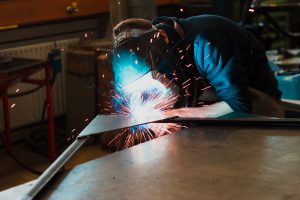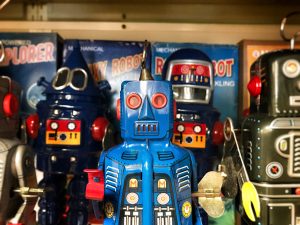5 secrets about working with cobots
Cobots, also known as ‘collaborative robots’, are the new generation of robots. They are complex systems involving sensors, software, and imaging tools which allow them to share a number of tasks with human co-workers.
So, what benefits are there to working with cobots – both for employers and employees? And are we at risk of robots taking our jobs?
Cobots are taking robots’ jobs
Robots were first introduced to the production line in 1962 by General Motors. And automotive remains the biggest user segment.
But now cobots are starting to overtake clunky old-school robots. The reason? Cobots combine flexibility with the precision and efficiency that robots excel at.
Not tied down to one task or process, they can be used for one area of the business then redeployed elsewhere. As low-value customised lines become more common in the automotive sector, cobots’ flexibility makes them a perfect fit.
Cobots are light on their toes
Move over, heavy machinery occupying a lot of space. One major advantage of working with cobots is that they tend to be small, lightweight and space-saving.
Features such as end-of-arm tooling and grippers work in the same way as fingers, expanding the cobot’s impact without taking up a large area on the factory floor.
And they are safer than robots: they shut off completely when a human enters the workspace and don’t need to be secured behind a cage like traditional robots. Sensors help them avoid speeding or reversing into their human co-workers.

Cobots don’t take jobs – they create them
Working with cobots doesn’t mean that robots are taking our jobs – far from it. In fact, industrial robotics jobs are set to increase.
Cobots don’t just rely on their advanced features to carry out their work; they also need robotics engineers and other colleagues to teach them how to carry out certain tasks, such as how to hold an object correctly. When Trelleborg Sealing Solutions in Denmark bought 42 cobots, it hired 50 more employees to manage them. Production output even rose.
Elsewhere, end-of-arm-tooling reduces the strain of ergonomically-taxing jobs such as screwing or hand-rolling. Likewise, position feedback allows them to carry out jobs that require consistency such as applying glue.

Cobots can ‘see’
Cobots use computer vision to extract high-level understanding about the space around them. Using one or more cameras, they take an image of the workspace or object they are working on. They then analyse this data and use position feedback and software to understand how best to position and orient themselves. For instance, if a cobot is working on an assembly line, this system helps it pick items from the conveyor belt.
Computer vision also makes cobots particularly adept at quality inspection for parts, speeding up this process which usually involves full inspection of all finished parts and high-resolution images of machined parts. Cobots also improve the accuracy of this stage.

Anyone can become a cobot programmer in less than 2 hours
Cobots are a particular boon for smaller companies. As well as being smaller and more flexible than traditional robots, they often tend to cost around 20% of the price. They typically have a payback period of six to eight months.
And adding cobots to your team doesn’t necessarily mean recruiting extra staff with specialised skills. Universal Robots Academy offers interactive training which enables anyone to learn to programme them in less than two hours.
Has your company introduced cobots to the workspace? Let us know in the comments below!
Looking for a worldclass automotive engineering recruitment agency with a knack for making its clients’ job easier? Call MasterSearch on +44 207 101 9623 or email rmasterson@mastersearch.co.uk.
Or are you looking for your next industrial automation job? Take a look at our latest job vacancies,
MasterSearch specialises in placing candidates in the European Industrial Automation and Automotive market. Our candidates and clients are never a number: we use our honesty and openness to build strong, long-lasting relationships. Specialising in this industry means we are uniquely placed to continually adapt to changes in this fast-paced and innovative market.




